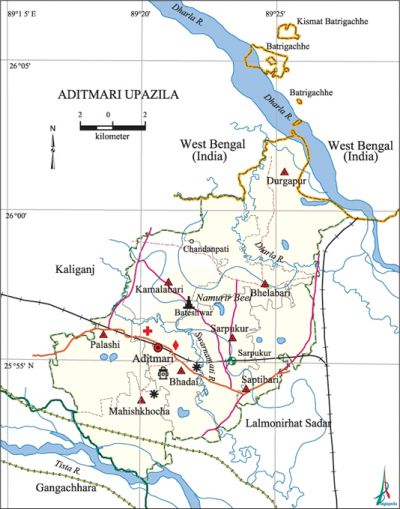Aditmari Upazila
Aditmari Upazila (lalmonirhat district) area 195.03 sq km, located in between 25°51' and 26°03' rth latitudes and in between 89°17' and 89°28' east longitudes. It is bounded by West Bengal (India) on the rth, gangachara and lalmonirhat sadar upazilas on the south, Lalmonirhat sadar upazila on the east, kaliganj upazila on the west.
Population Total 224796; male 112243, female 112553; Muslim 186547, Hindu 38178, Buddhist 1, Christian 26 and others 44.
Water bodies dharla, tista and' Sharnamati rivers and Namurir Beel are table.
Administration Rangpur Collectorate was established in 1769 to facilitate the administration of the east india company. Furunbari Thana was formed under this Collectorate which was shifted to Kaliganj in 1872. Aditmari Thana was established in 1980 comprising some parts of Kaliganj Thana and it was turned into an upazila on 7 November 1983.
| Upazila | ||||||||
| Municipality | Union | Mouza | Village | Population | Density (per sq km) | Literacy rate (%) | ||
| Urban | Rural | Urban | Rural | |||||
| - | 8 | 56 | 102 | 19355 | 205441 | 1153 | 58.3 | 43.8 |
| Upazila Town | ||||
| Area (sq km) | Mouza | Population | Density (per sq km) | Literacy rate (%) |
| 15.99 | 3 | 19355 | 1210 | 58.3 |
| Union | ||||
| Name of union and GO code | Area (acre) | Population | Literacy rate (%) | |
| Male | Female | |||
| Kamalabari 59 | 6236 | 14110 | 13927 | 39.9 |
| Durgapur 41 | 8221 | 14727 | 15160 | 52.0 |
| Palashi 77 | 6320 | 15842 | 15398 | 45.4 |
| Bhadai 10 | 5179 | 12916 | 12902 | 58.5 |
| Bhelabari 11 | 6502 | 13567 | 13644 | 44.9 |
| Mahishkhocha 71 | 5142 | 12440 | 12926 | 38.4 |
| Saptibari 83 | 4644 | 12884 | 12848 | 44.0 |
| Sarpukur 89 | 5948 | 15757 | 15748 | 37.8 |
Source Bangladesh Population Census 2011,Bangladesh Bureau of Statistics.
War of Liberation The upazila was under Sector 6 of the War of Liberation in 1971. On 4 April the Pak army carried out a surprise attack on Aditmari, set many houses on fire and caused heavy damages. During the War of Liberation the Pak army killed many innocent people at Lalpur on the east side of Aditmari Railway Station. Aditmari was liberated on 6 December. There is a mass grave at the Battrish Hazari High School playground.
For details: see আদিতমারী উপজেলা, বাংলাদেশ মুক্তিযুদ্ধ জ্ঞানকোষ (Encyclopedia of Bangladesh War of Liberation), বাংলাদেশ এশিয়াটিক সোসাইটি, ঢাকা ২০২০, খণ্ড ১।
Religious institutions Mosque 525, temple 80, tomb 1. Noted religious institutions: Khetu Mohammad Sarkar Jami Mosque, Sher Mamud Jami Mosque and Sharnamati Shivasram (Bateshwar).

Literacy rate and educational institutions Average literacy 45.1%; male 48.6%, female 41.6%. Educational institutions: college 3, secondary school 38, primary school 107, madrasa 38. Noted educational institutions: Aditmari Degree College (1991), Saptibari Degree College (1992), Aditmari Kanteshwar Barman Girl's Secondary School and College (1986), Mahishkhocha EM School (1931), Bhadai Girija Shankar High School (1942), Aditmari Girija Shankar High School (1942), Kumrirhat SC Bilateral High School (1949), Saptibari High School (1957), Bhelabari High School (1960), Uttar Gobdha Dakhil Madrasa (1986).
Newspapers and periodicals Sonali Probhat, Bijoy Smriti, Prochhod.
Cultural organisations Library 43, club 64, cultural society 2, rural theatre group 12, opera party 3, women organisation 1, cinema hall 2, playground 13.
Tourist spots Khetu Mohammad Sarkar's bridge and well.
Main sources of income Agriculture 77.32%, n-agricultural labourer 2.40%, industry 0.36%, commerce 9.55%, transport and communication 2.31%, service 3.26%, construction 0.48%, religious service 0.23%, rent and remittance 0.28% and others 3.81%.
Ownership of agricultural land Landowner 64.02%, landless 35.98%; agricultural landowner: urban 61.88% and rural 64.23%.
Main crops Paddy, tobacco, potato, corn, mustard seed, vegetables.
Extinct or nearly extinct crops Local varieties of Aush paddy, jute, china, kaun, varieties of pulses.
Main fruits Jackfruit, betel nut, mango, litchi, grape fruit, coconut.
Fisheries, dairies and poultries This upazilla has a number of fisheries, dairies and poultries.
Communication facilities Roads: pucca 101 km, mud road 438 km; waterway 4 km; railway 17 km.
Extinct or nearly extinct traditional transport palanquin, boat, horse carriage, bullock cart and buffalo cart.
Cottage industries Bidi factory.
Hats, bazars and fairs Hats and bazars are 12, fairs 11, most ted of which are Namurir Hat, Durgapur, Shathibari, Bhelabari and Kumrir hats and Natkur Banni Mela, Majaner Mela, Dasharar Mela and Charaker Mela.
Main exports Tobacco, bidi, potato, corn, vegetables.
Access to electricity All the unions of the upazila are under rural electricity net-work. However 20.8% of the dwelling households have access to electricity.
Natural resources High quality stone composed of silicate and manganese have been traced in this upazila.
Sources of drinking water Tube-well 97.1%, tap 0.3% and others 2.6%.
Sanitation 79.1% of dwelling households of the upazila use sanitary latrines and 15.2% of dwelling houses use non-sanitary latrines; 5.7% of households do not have latrine facilities.
Health centres Upazila health complex 1, union health centre 1.
NGO activities Operationally important NGOs are brac, proshika, asa. [Tanjimul Nayan]
References Bangladesh Population Census 2001 and 2011, Bangladesh Bureau of Statistics; Cultural survey report of Aditmari Upazila 2007.
